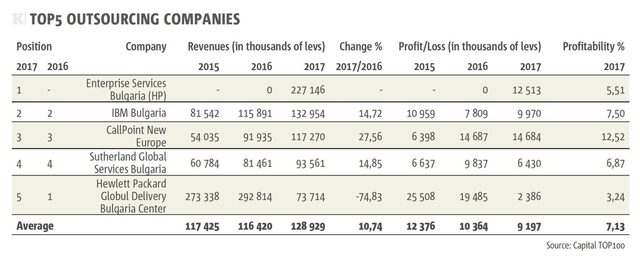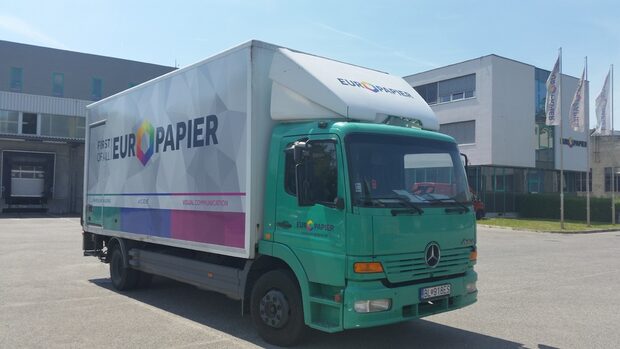Shared services have been expanding robustly in Bulgaria during the past decade. The sector has grown to about 3.6% of GDP, expected to reach 4.2% by 2020. Combined revenues surpassed 2.5 billion levs in 2017 and the industry has become a draw for Bulgaria's youth. The biggest contributor is IT outsourcing, which now accounts for 47% of sector turnover. In Bulgaria, over 10,000 people are employed in the top five firms, whose total revenue surged at an annualized rate of 11% in 2017. The new HP Newly-founded Enterprise Services Bulgaria took the lead in outsourcing in 2017 with revenue of 227 million levs. In fact, the seemingly fresh addition to the ranks is heir to the company standing at number five - Hewlett-Packard Global Delivery Bulgaria Center, which transferred a large part of its operations, such as customer services, consultancy and server and network infrastructure maintenance, to the new enterprise last year. Both firms are part of tech giant Hewlett Packard Enterprise, the largest employer in Bulgarian IT and outsourcing, with close to 4500 people employed in their combined ranks last year.

The changes became necessary following the 2016 global deal between Hewlett Packard Enterprise and Computer Science Corp. Both companies have a massive presence in Bulgaria. Consequently, services and software operations were spun off into a new firm - DXC Technology Bulgaria - whereas tech support and other services were allocated to Hewlett-Packard Global Delivery Bulgaria Centre and Enterprise Services Bulgaria. The last two enterprises accumulate total turnover of over 300 million levs. and the other three IBM Bulgaria comes in at number two in this year's edition of the ranking. The company manages IT systems and offers other technological services to many clients of global giant IBM. The Bulgarian crew tallies around 2000 people, including employees working in the trade department. Turnover expanded at an annualized growth rate of 15% in 2017, peaking at 133 million levs. CallPoint New Europe, otherwise known by parent-company name TELUS International Europe, ranks third with revenues of 117 million levs - a 30% increase relative to 2016. The call centre stands as the biggest employer in the traditional outsourcing industry in Bulgaria with a team of over 3000 people in total in Sofia and Plovdiv-based offices in 2018. The Bulgarian firm is part of Canadian telecommunications giant TELUS, which entered the country in 2012 through the acquisition of CallPoint New Europe. In March of this year, the company moved to a new office in Sofia located in TELUS Tower where it plans to draw even more people to its ranks. With over 20 spoken languages, the enterprise provides services to a variety of firms, including Google. According to TELUS International CEO Jeffrey Puritt, the number of employees could expand to 5000 within the next two years. CallPoint New Europe is also the most profitable company in the ranking with recorded profit of 14.7 million levs and a net margin of 12.5% in 2017. Fourth in outsourcing comes another branch of a global giant - Sutherland Global Services Bulgaria. During its 10-year stay in the country, Sutherland has expanded its local staff to 1700 employees, who work in four offices - two in Sofia, and one in Burgas and Varna each. The company offers a variety of services - from call centers to IT support - to big corporations. Sutherland plans to continue expanding in Bulgaria and expects to employ 1300 more people in the coming years. The revenue of Sutherland Global Services Bulgaria peaked at 94 million levs in 2017, which is a significant rise compared to 61 million levs grossed two years prior. Most companies in outsourcing plan to continue to expand operations and increase employee numbers within the next year. With the coming of AI and automation, traditional call centres are under threat of gradual closure, which can also be seen as a window of opportunity. With its highly-qualified workers, Bulgaria has a chance to move up the value chain, offering more and more complex services.
Shared services have been expanding robustly in Bulgaria during the past decade. The sector has grown to about 3.6% of GDP, expected to reach 4.2% by 2020. Combined revenues surpassed 2.5 billion levs in 2017 and the industry has become a draw for Bulgaria's youth. The biggest contributor is IT outsourcing, which now accounts for 47% of sector turnover. In Bulgaria, over 10,000 people are employed in the top five firms, whose total revenue surged at an annualized rate of 11% in 2017. The new HP Newly-founded Enterprise Services Bulgaria took the lead in outsourcing in 2017 with revenue of 227 million levs. In fact, the seemingly fresh addition to the ranks is heir to the company standing at number five - Hewlett-Packard Global Delivery Bulgaria Center, which transferred a large part of its operations, such as customer services, consultancy and server and network infrastructure maintenance, to the new enterprise last year. Both firms are part of tech giant Hewlett Packard Enterprise, the largest employer in Bulgarian IT and outsourcing, with close to 4500 people employed in their combined ranks last year.













